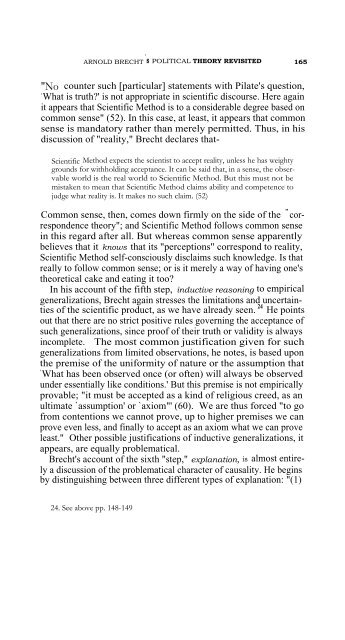ARNOLD BRECHT'S POLITICAL THEORY REVISITED Political ...
ARNOLD BRECHT'S POLITICAL THEORY REVISITED Political ...
ARNOLD BRECHT'S POLITICAL THEORY REVISITED Political ...
You also want an ePaper? Increase the reach of your titles
YUMPU automatically turns print PDFs into web optimized ePapers that Google loves.
<strong>ARNOLD</strong> BRECHT ' S <strong>POLITICAL</strong> <strong>THEORY</strong> <strong>REVISITED</strong> 165<br />
"No counter such [particular] statements with Pilate's question,<br />
`What is truth?' is not appropriate in scientific discourse. Here again<br />
it appears that Scientific Method is to a considerable degree based on<br />
common sense" (52). In this case, at least, it appears that common<br />
sense is mandatory rather than merely permitted. Thus, in his<br />
discussion of "reality," Brecht declares that-<br />
Scientific Method expects the scientist to accept reality, unless he has weighty<br />
grounds for withholding acceptance. It can be said that, in a sense, the observable<br />
world is the real world to Scientific Method. But this must not be<br />
mistaken to mean that Scientific Method claims ability and competence to<br />
judge what reality is. It makes no such claim. (52)<br />
Common sense, then, comes down firmly on the side of the " correspondence<br />
theory"; and Scientific Method follows common sense<br />
in this regard after all. But whereas common sense apparently<br />
believes that it knows that its "perceptions" correspond to reality,<br />
Scientific Method self-consciously disclaims such knowledge. Is that<br />
really to follow common sense; or is it merely a way of having one's<br />
theoretical cake and eating it too?<br />
In his account of the fifth step, inductive reasoning to empirical<br />
generalizations, Brecht again stresses the limitations and uncertainties<br />
of the scientific product, as we have already seen. 24 He points<br />
out that there are no strict positive rules governing the acceptance of<br />
such generalizations, since proof of their truth or validity is always<br />
incomplete. The most common justification given for such<br />
generalizations from limited observations, he notes, is based upon<br />
the premise of the uniformity of nature or the assumption that<br />
`What has been observed once (or often) will always be observed<br />
under essentially like conditions.' But this premise is not empirically<br />
provable; "it must be accepted as a kind of religious creed, as an<br />
ultimate `assumption' or `axiom"' (60). We are thus forced "to go<br />
from contentions we cannot prove, up to higher premises we can<br />
prove even less, and finally to accept as an axiom what we can prove<br />
least." Other possible justifications of inductive generalizations, it<br />
appears, are equally problematical.<br />
Brecht's account of the sixth "step," explanation, is almost entirely<br />
a discussion of the problematical character of causality. He begins<br />
by distinguishing between three different types of explanation: "(1)<br />
24. See above pp. 148-149
















